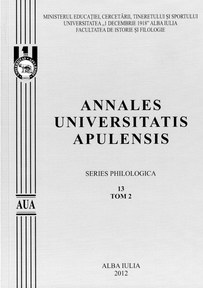Manifestations de la peur chez Amos Oz
Forms of the Fear with Amos Oz
Author(s): Mirela Sanda SălvanSubject(s): Literary Texts
Published by: Universitatea »1 Decembrie 1918« Alba Iulia
Keywords: Identity; Anxiety; Depressive personality; Obsessive personality; Identity mechanism
Summary/Abstract: Starting from the typology of forms of anxiety created by Fritz Riemann, we will analyze two characters in the novel Un juste repos / A Real Rest by Amos Oz; the latter are representative for the two types of personality defined by the German psychoanalyst as: depressive personality and obsessive personality. Julek Lifschitz, the secretary of the kibbutz Granot in Israel, and his son, Jonathan Lifschitz, correspond to two ways of living life, ways which recall these two identity structures and the forms of anxiety associated to them: the anxiety about change in the case of the obsessed individual and the anxiety about becoming himself in the case of the depressed individual. As any type of fear – especially when manifested constantly – can become an identity mechanism which has an essential role in one’s becoming, we will comment on the way in which the two forms of anxiety structure the behavior of the characters in question. The concepts and the phenomena we will use in our analysis will put forth tendencies and structural parts which define normal, complex personalities and which are outside any pathological form. The fear of individuation – a consequence of a rigid upbringing which does not allow the child to manifest himself, to come in contact with his own depths and to express them – is present in the life history of young Jonathan up to the moment when he decides to leave his native land in order to try to live a “true” life. Representative for the depressive personality, Jonathan’s behavior highlights the distress of a person who finds it impossible to express his desires, affections and drives. In the psychoanalytical language, the problem of this young man is manifested by his impossibility to own something, to become the possessor of an object. On the other hand, the desire for permanence and the fear of change which are characteristic to Julek translate into a tendency to preserve everything in a fixed, pre-established form. This character illustrates the qualities and the weaknesses of the obsessed individual: on the one hand, he evokes the stability, the resistance, the discipline, the organizational spirit and the feeling of duty which define this personality structure; on the other hand, his authoritarian tendencies, the impossibility to be empathic, the excessive implication in political causes and the stifling of any form of emotion will result in unsatisfactory relationships with the others in general and with the members of his family in particular.
Journal: Annales Universitatis Apulensis. Series Philologica
- Issue Year: 13/2012
- Issue No: 2
- Page Range: 203-216
- Page Count: 13
- Language: French

